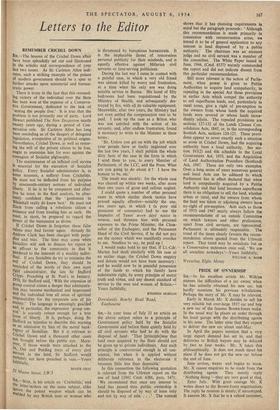Sta,—In your Issue of July 23 an article on the
above subject refers to a principle of Government policy held by the Socialist Government and before them quietly held .by all civil servants who had to do with the disposal of land: ' That [principle]was that land once acquired by the State should not be given up to private individuals. Any such principle is controversial enough in all con- science, but when it is applied without deliberate reference to the electorate it becomes little less than damnable' In this connection the following quotation is relevant from the Utlyniatt report on the use of land (1942 Cmd. 6386, para. 147): ' We recommend that once any interest in land has passed into public ownership it should be disposed of by way of lease only and not by way of sale. . . .' The context
shows that it has planning requirements in mind but the paragraph proceeds: Although this recommendation is made primarily in connection with reconstruction areas, we intend it to be of general application to any interest in land disposed of by a public authority.' The chairman was an eminent judge and no civil servant was a member of the committee. The White Paper issued in June, 1944, (Cmd. 6537) warmly commended the report and did not indicate dissent from this particular recommendation.
Still more relevant is the action of Parlia- ment, when power is given to Public Authorities to acquire land compulsorily, in repealing in the special Act those provisions in earlier Acts which compel the authority to sell superfluous lands, and, particularly in rural areas, give a right of pre-emption to the owners from whose lands the acquired lands were severed or whose lands imme- diately adjoin. The repealed provisions are sections 127-132 of the Lands Clauses Con- solidation Acts, 1845, or, in the corresponding Scottish Acts, sections 120-125. These provi- sions appear to cover exactly such a situation as arose at Crichel Down, had the acquiring authority been a local authority. See sec- tion 161(2) and 6th schedule to the Local Government Act, 1933, and the Acquisition of Land Authorisation Procedure (Scotland) Act, 1947. These are only two examples. Over a long series of years numerous general and local Acts can be adduced in which Parliament has in effect declared that when land is compulsorily acquired by a Public Authority and that land becomes superfluous there is no obligation to sell the land, whether urban or rural, and the owners from whom the land was taken or adjoining owners have no right of pre-emption. Acts such as those of 1933 and 1947 nearly always follow the recommendations of an outside Committee on which lawyers and other professions, apart from civil servants, are represented. Parliament is ultimately responsible. The trend of the times clearly favours the recom- mendation above quoted from the Uthwatt report. That trend may be socialistic but as a Conservative statesman once said, We are all socialists nowadays.'—Yours faithfully,
Westerlea, Elgin, Moray
WILLIAM A. ROSS


































 Previous page
Previous page